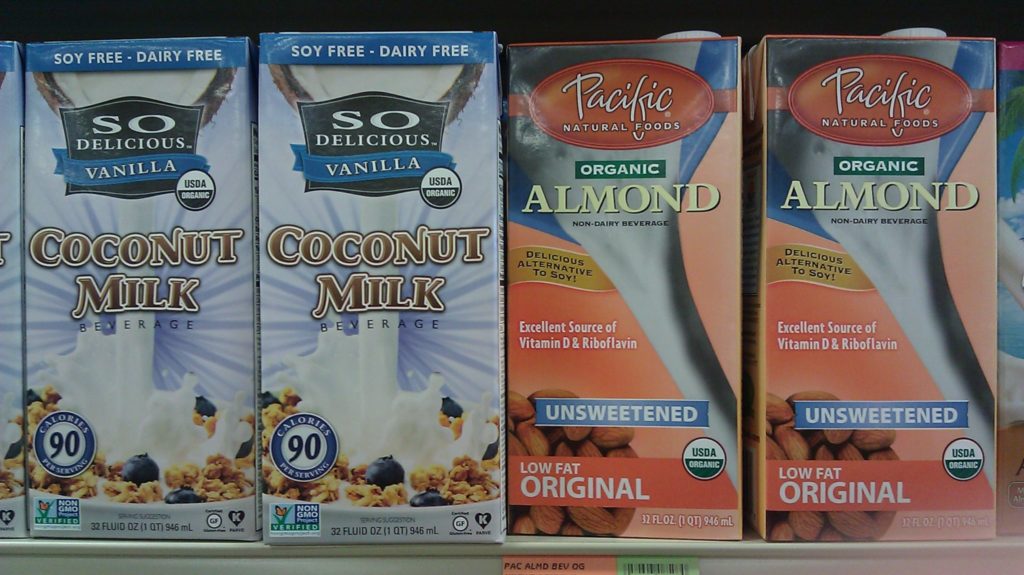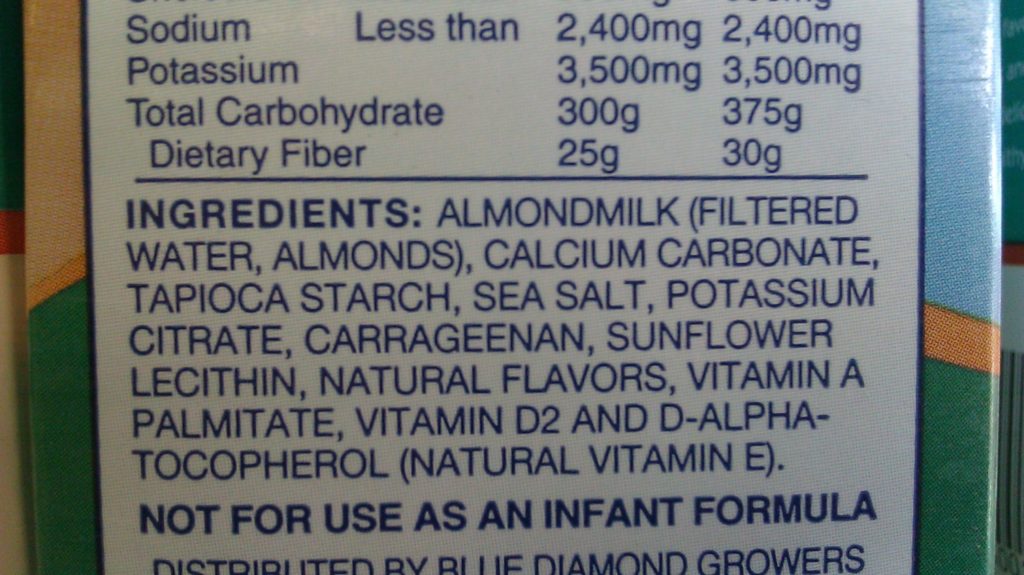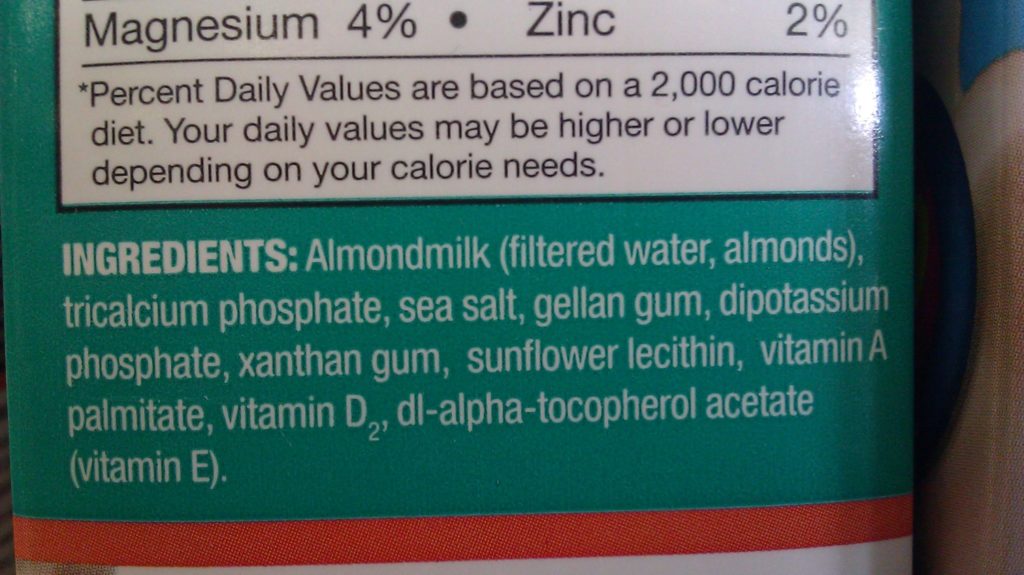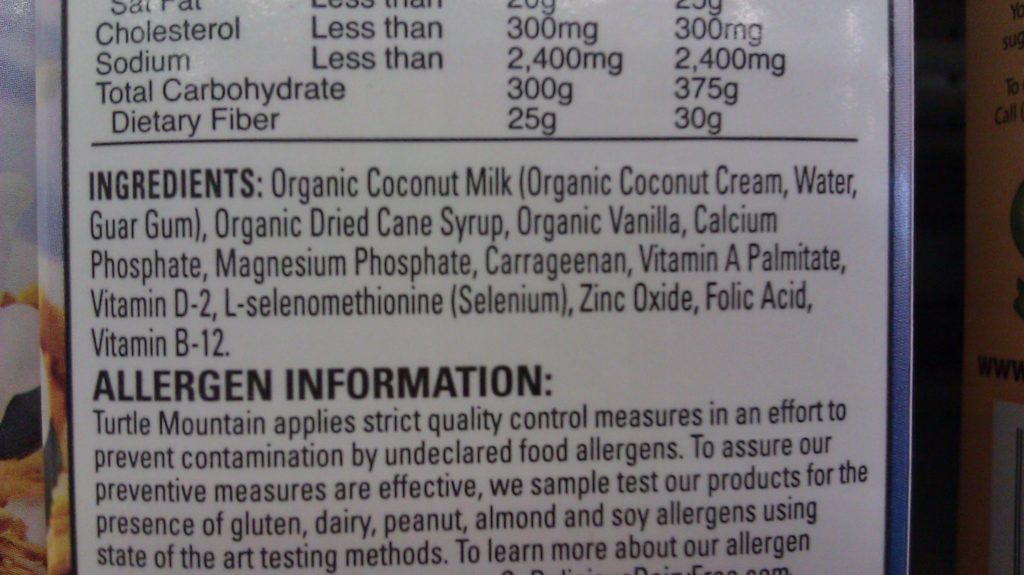 Organic coconut milk and almond milk are common purchases at the health food store by those with dairy allergies. Usually, these people are savvy consumers who know enough nutritionally to avoid soy milk with its endocrine disrupting isoflavones and gastric inflaming phytates. Rice milk is also steadily declining in popularity as it is really not much more than a glass of sugar water nutritionally speaking.
Organic coconut milk and almond milk are common purchases at the health food store by those with dairy allergies. Usually, these people are savvy consumers who know enough nutritionally to avoid soy milk with its endocrine disrupting isoflavones and gastric inflaming phytates. Rice milk is also steadily declining in popularity as it is really not much more than a glass of sugar water nutritionally speaking.
Organic, unsweetened coconut milk and almond milk in cartons seem like great alternatives at first blush, but are they really as “healthy” as people believe?
Let’s take a look at the labels. I was shocked at what I found.
Check out the labels of the three brands I photographed. I checked all the brands, by the way, and they all contained the same dangerous additives I’m about to describe.

First, Vitamin A Palmitate is added, the synthetic version of Vitamin A. I personally avoid synthetic versions of Vitamin A like the plague. Every single multi-vitamin I’ve ever examined contains some form of synthetic A, including the so called “whole foods” multis.
Synthetic vitamins are the chemical mirror images of the real, natural versions. They can cause imbalances over time. Even small amounts of the synthetic fat soluble vitamins like Vitamin A can prove toxic and should be strictly avoided!
The Organic Consumers Association warns that isolated vitamins such as those produced synthetically cannot be recognized or metabolized by the body in the same way as the natural version.

Large doses of natural vitamin A are well tolerated by the body as established by researchers decades ago, however. Traditional diets contain 10 times or more of the RDA of this nutrient with no ill effect. However, synthetic vitamin A is associated with birth defects and bone fractures. It has no benefit in the diet whatsoever.

The second really bad additive in these organic cartons of coconut milk and almond milk is Vitamin D2. Vitamin D2 is a form of the wonder vitamin that you should take great pains to avoid.
In all known cases of Vitamin D toxicity where the dose was intentional, Vitamin D2 was the culprit. By comparison, Vitamin D3 is much less toxic and requires an enormous or even an accidental dose to produce any toxic effect.
Vitamin D2 is manufactured industrially by irradiating yeast. It is dangerous for D2 to be added to any food product particularly if this product would be given to children, where toxicity symptoms would appear at much lower dosages.
None of the store brands of cartoned coconut milk or almond milk were free of these dangerous and synthetic versions of the fat soluble vitamins!
Notice also that carrageenan is present in 2 of the 3 products as well! Dr. Andrew Weil has been telling people to avoid carrageenan since 2002.
Carrageenan is so toxic and inflaming to the human digestive system that this food additive is formally classified by the International Agency for Research on Cancer (part of the World Health Organization) as a potential human carcinogen.
In my view, it would be a mistake to purchase and consume these items. They are in no way health promoting or beneficial, particularly for growing children!
Healthy Alternatives to Coconut Milk and Almond Milk in Cartons
Coconut milk and almond milk should be healthy and they can be if they are produced at home without these dangerous additives. I wrote an in depth post on how to easily make these nondairy beverages yourself. This recipe for wild rice milk is a good option as well.
Believe it or not, even organic coconut milk in BPA free cans would be a better alternative to cartons of coconut milk based on my label inspection!
Check out my video on homemade coconut milk and my article on how to make healthy DIY almond milk, fermented to add probiotics and enzymes to boost immunity and improve digestion.
Sarah, The Healthy Home Economist
Sources
From Seafood to Sunshine: A New Understanding of Vitamin D Safety








Most people who cannot tolerate dairy have a problem with the A1 casein. I know many people who consume dairy from cows with the A2 casein and are fine. Many are so happy to be able to consume dairy again. You can get raw cheese and cultured dairy beverages at http://www.RealMeatandDairy.com. This is the new food company opened by Jordan Rubin.
I just ck’d the label on a carton of 2% milk from the grocery store and it contains Vit A Palmitate as well.
http://t.co/xMuMrxqB
HI Sarah
I buy coconut milk in cartoons instead of cans. My kids don’t like it but I love it in smoothies with frozen blueberries and raw egg yolks, and to make crepes.
The only ingredients are coconut and water. Do you think the cartons have a BPA lining? Thank you!
Hi Marina, I would call the manufacturer and ask some pointed questions about the packaging.
what brand did yyou find that only has those ingrediants?
I want to know too, I can’t find anything like this in NYC, especially in USDA Organic. Whatever I’ve seen or tried has other ingredients I don’t want and tastes bad, nothing like fresh young Thai coconuts.
Thanks for this article. I was tempted to buy some a little while back, but stopped when I saw a long list of ingredients. I wasn’t even sure why, but I decided to skip it. I guess intuition stepped in. Now I know why.
@twila it lasts about 4-5 days. It might be good for longer.
I am nursing my 4 month old, and I just started taking New Chapter Organics perfect prenatal to replace my cheap Target brand ones, and I have been really happy with these so far. Even though we are a Real/Whole Food household with raw milk, traditional fats, very limited processed food etc, I have read the dietary guidelines (I think from Nourishing our Children?) for the amount of food I would need to eat each day to get all my vitamins and minerals, and it is just not realistic for me. Too much food!
I do take 1/2 tsp fermented cod liver oil/butter oil each day, I try to take frozen liver pills regularly, and I drink Kombucha, but I just want to make sure that I am getting all the nutrition my body needs to make nutritionally sound breastmilk for my son.
Despite the fact that the Vitamin A is 100% beta carotene is really better for me not to take the prenatal at all?
Okay, here is the link I was reading: http://www.holistickid.com/the-outlandish-alternative-to-prenatal-vitamins/
The issues I have are seafood 2-4 times a week… This is difficult from a budget standpoint, but maybe if I counted canned tuna, it would work?
And the quart of raw milk seems like a lot to me. We already blow through 2 gallons a week without me drinking even half that much.
Although maybe if I put the $15 a month I am putting toward the vitamin toward the seafood or the extra milk, it could work….
Anyway, I’d love to hear your thoughts on this, Sarah. Thanks!
Hi Megan, we all have to make our own choices, but for the record, I myself never took a prenatal vitamin EVER with any of my 3 pregnancies. I just ate whole foods and for the second and third pregnancies, took cod liver oil and butter oil plus dessicated liver. I also consumed copious amounts of grassfed raw dairy in the form of milk, cheese, cream, and butter. All 3 children are healthy with no allergy or auto-immune issues.
Hi Megan,
I did take prenatal vitamins with all three of my pregnancies. In fact, the same New Chapter Organic whole food prenatal vitamins you are taking.
However, I never ate any animal products (animal flesh, animal organs, animal fats or oils), no cow milk, cow cheese, cow butter, eggs, etc and all three of my children are exceptionally healthy and have never been to the doctor for anything – ever. They have no allergies or auto-immune issues either. In addition, they are also extremely intelligent and a grade above their peers in school. I myself am also in excellent health and had my last two pregnancies while in my 40’s. I recently had blood work done and all of my test results were well within the normal range including calcium, protein, iron, cholesterol, etc.
This alone proves it is a fact that you can be healthy an thrive on both an animal-based diet as well as a plant-based diet – as long as you make sure you are getting all the essential nutrients your body needs, which is the key.
And yes, I agree that we all have to make our own choices regarding the diets we choose for ourselves and our families, but we should also not judge others who have differing opinions or different diets than we have chosen to make.
We are allegrgic toc conut 🙁 So We should make our own almond milk???? My daughter is sensitive to almonds too and allergic to cashews. any other suggestions???
hemp milk maybe?
Milk isn’t really necessary beyond breast milk for babies. You can sub water or juice for baking if you can’t find an acceptable alternate. Hemp or oat might work if you need something for your coffee or when you want something like milk to drink (though check those labels if you aren’t making your own).
I just called So Delicious (Turtle Mountain, LLC) and their office is not open yet, but I am going to continue to call until I can speak with someone. There is no good reason that they should put synthetics in their products to appease just one group of their consumers.
I have also contacted So Delicious, but only by e-mail. I have told them I will not allow my family and friends to consume their coconut beverage until these synthetics are removed. I highly encourage anyone to call or e-mail them about removing these items from their products.
Wow! This is eye opening. I have a little one that is allergic to dairy and have been givin her almond milk. Thank you to all that gave recipes on how to make your own.